#the horrifying experience of being a child in the streets
Explore tagged Tumblr posts
Text
ZERO (i) : SCAVENGERY . (ms/next)



-> plot synopsis - you don't think you're as odd and horrifying as the news makes you out to be. but you have never much cared for the validation of others, and certainly not theirs.
-> batfamily x serial killer reader. playlist (wip) ask 2b added to taglist
-> tw; gn reader, guns, referenced assault, violence, toxic relationships, eventual fem love interest, bug taxidermy, unhealthy coping mechanisms, murder, sociopathic tendencies, full on master list.
> a/n; horribly in love with the idea of a self-sufficient classy mean judge. reblogs and interactions appreciated!! a lot (●'◡'●)

in fact, you are grateful for their ignorance. you do not need their recognition, their thanks.
you won’t say you’re not petty, not childish, not absurd and not disgusting for what you’re doing, but you’ve heard it innumerable times before, and don’t mind it now. in a matter of days, the limits you’ve placed on yourself have become the bane of your existence.
bright, technicoloured posters with you favourite bands and characters hang on the walls, music playing merrily on a small portable speaker you’d bought with your self-earned pocket money. it all provided the perfect image of a regular teenager, to the extent that you weren’t really creating a civilian identity like your family, but living through it. normally.
it makes you giddy, and you know it shouldn’t, to be so unsuspecting. your grades are mediocre, but your teachers praise your work, you’re not popular enough to go be invited to every party, but enough to be friends with three quarters of the grade, not dedicated enough to a franchise to know it super well, but still enjoy it through multiple perspectives. normal, exceptional, and normal.
that’s what makes it all the more rewarding to do what you do. since being adopted at eleven, you’ve pieced together the caped identities of the monolith you call your family with lovely colour-coded pin boards and pictures. you know they escape into the night to fight not criminals, but fight crime, beating and getting beat in the process.
you think it’s tedious, but you never comment. there’s not much you remember prior to coming into the manor, except the raw experiences from fleeing cheerfully down unkempt, spray painted, molding stairway chambers with your friends away from an angry neighbour, laughing the whole way down. sharing fries for one among six to seven people, since money was hard to get by and harder to go around and listening to the one person who could afford school talk about it. pushing your friends on the swings and them tying your laces in return, since the swings were too far from the ground to push yourself, and scratchy velcro was for “sissies”.
you could say your childhood was rugged, but fairly kind for a gothamite. you weren’t given the life of a gilded richman’s son like tim, or the hard street crime life of jason. you weren’t raised by assassins or masters like damian and cassandra, not clever and determined like duke, not gifted with athleticism like dick. normal, incredibly. lucky, even.
you cannot think of anyone when you think of family. you considered your group of friends (acquaintances does your relationship better justice, but at ten, everyone was a friend if they didn’t wear a badge and a cap) family, but you knew that’s not what the word meant. they’d go back home to fighting parents, single mothers, thieving fathers, earning siblings or aging aunts and uncles. you would go home to a quiet one-room apartment and a poor quality mattress.
it’s not fair to say you weren’t cared for. the neighbourhood considered you their darling child, your friends’ parents sending you food, aunties reading you stories and elderly residents providing comfort when you wanted the rare support of an adult. but you had no family because by your accord, you would have to return home to them for someone to be family.
it’s the opposite now. you return home from school to bruce wayne and his entourage of misplaced children, but your interactions are stiff as stone. you go out to diners and have the most soulless conversations, stay in the house and refuse to partake in their exchanges.
because you are different. their morals are aligned to your guardian’s, of justice and strength and so on, so on. your morals are aligned with your survival, no one else's, selfish, scavenging. you cannot get along on a base value, because you don’t belong to their nest of canaries. you are, as a silly buzzfeed quiz at five in the morning said, a shrike.
yet still, you seeked the warmth of family. the resurgence of that feeling you once had in your old life. you could never return, having now experienced the fruits of luxury, having lived too far from “home” for far too long, with the added weight of a bruce wayne shaped shadow that followed you. the immense danger it would bring to yourself and those around you would be preposterous, unimaginable, but no more horrifying than the awkwardness you'd receive from you old not-family. scrutinising stares, untrusting glances, forced waves. no, no, it wouldn’t do. you don’t want to feel miserable.
it’s enough that your presumed family already gives you those looks. sneers from damian, concerned glances from cassandra, brief unease from dick, ignorance from tim, you could go on and on and on. and you’re not stupid. you only have yourself to blame.
your vanity, as the buzzfeed quiz had said, in curling cursive font that sometimes turned to boxes on the ui, presented itself as a horrifying ignorance. unlike a peacock’s gushing beauty, your pretty-factor extended only as far into first impressions. when someone gets closer, enough to see the white of your eyes, they shrink away.
crude comments, satirical dismissal, and sharp judgement are things that have, in air quotes, made you unlikable. when watching a documentary about bug-taxidermy on one of the tvs, damian had walked in and commented on the generous “inhumanity” of it. instead of justifying the practice with explanations of how ethical it was, you’d scoffed and called him dramatic. he antagonised you, and you couldn't care less.
mean things left your mouth without hesitation, “who cares” and “you’re doing too much” at the simplest things. but you didn’t do it on purpose. growing up, kindness was reserved only for people in your circle, barterers of goods and generosity. you were polite to the old ladies who brought you food, nice to the new kid who looked at you for guidance, and offered support to people who’d offered that to you too.
you had no obligation to be kind to the wayne household. they had done nothing for you, other than pulling you out of a blood stained alley and providing you a home you didn’t ask for. you weren’t let in on their family bonds and not given the chance to create mutual trust with them, and were not keen on it after their whitewashed kidnapping either.
perhaps you had the frayed edges of low-class living from gotham’s alleys, but you also had firmly set, stich, stern and strict guidelines about your behaviour. you would not make the first move, and you would not do more than fulfill debts. one favour for another, never more.
that’s what makes your secretive secret side job exhilarating. you have no need to do what you do, except for a sense of duty. the term itself, obligation, is unfamiliar, exciting. like many, but not the majority, the batman and his menagerie’s morals seem too high standing for the crevices of gotham’s underworld. only the red hood can relate, and even he is too far from the truth in your eyes.
death was a permanent solution to the wrongs of people. but you could not simply just wipe out a criminal from the street and call it a day. the only striking similarity between you and bruce wayne, was that the two of you didn’t fight criminals, but fought crime. you snuffed it out as it started hinting at the surface, not waiting for a track record or a ticket list on a license. nothing was forgiven, because you were not obliged to forgive.
you did not forgive, but did excuse. the theft of food, the death of someone too touchy, the fractured ribs of a parent too cruel, were excused. because like you, the suspect, the criminal, was also simply bartering. a favour for a favour, a wicked death for a wicked life. they would be let off from your radar, until someone else got to them. you were not obliged to save them. you are duty-bound only to rid.
out of habit really, you resorted to violence. seeing a lady bothered by a fellow too close a few months back, you did what came naturally without the supervision of domineering adults and officers and shot him point blank. for a second, the woman stilled, painted in blood from the spray that arced to her, before screaming in horror and fleeing, without so much as a glance in your direction.
you were unperturbed by the lack of thanks, with a hint of humour at the thought, since it meant you were not indebted to her and she was not to you.
but it’s the realisation that comes shortly after, that a fine or a scolding would not similarly scare away the man, and he was now well taken care of. and you think of the other scummy people hiding gotham’s crowded basements, and think of their freedom. it makes you angry, it always has, truly it does. death was not an uncommon occurrence in gotham, the murders and abductions, cruelty and pain all as abundant as the trash, poverty and crime within the city. why was it only an offense when it came to the people who perpetuated it?
comfort does little to save victims. a bag of cash and a pat on the back will not rid them of their memories, sadness, or their losses. you are neither sympathetic nor can you relate, but you are angry. have been angry. on their behalf. the world is a rotten and sick place, and this city is especially so. and while batman is a poor janitor, the red hood one too late, and the monolith of your family too distant, you are decided. you’ll wash this place clean like a broken truck, knowing it’ll never work again, but look pretty as it remains.
and you, a good-for-nothing, always scorning, useless kid, are unsuspecting. you are grateful for their ignorance. you do not need their recognition or their thanks.

> a/n i think this is a solid part one for a prologue bit. the crow choir series is getting a bit neglected because i want to think over its intricacies a bit better. in contrast, this is a very kick and throw kind of plot line, more fun to write for.
i've been super nervous to post on tumblr but am enjoying it. hopefully will upload the next bits soon, interactions so very very appreciated! esp ideas in comments or asks, because it makes me feel like i'm not wiling away the time i should use for other things (T_T) overall just feels nice too.
thank you for reading!!

#saria 💤 says#'25 run: scavengery#yandere!batfam#yandere batfam#yandere batfamily#batfam x reader#batfamily x reader#yandere batfam x reader#yan batfam#yan batfam x reader#x male reader#x gn reader#yandere x reader#dc x reader#yandere dc#yandere batboys#batfam x neglected reader#batfam x villain reader
492 notes
·
View notes
Text
who's afraid of little old me? -s.w

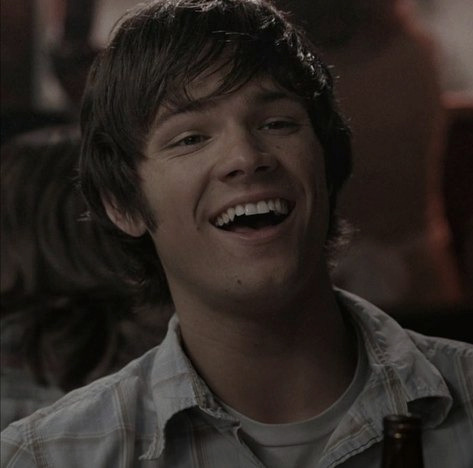


Paring; sam x reader
Prompt; 'I want to snarl and show you just how disturbed this has made me. You wouldn't last an hour in the asylum where they raised me.'
Requested;@nix-rose
Notes;so sorry this took so long exams are kicking my ass
Masterlist | Taylor Swift masterlist

Laughter rang out through the air as children ran happily around the small playground. It wasn’t often you got much free time in the towns you visited so when the occasion arose you were quick to snap up the chance.
“I miss being this carefree.” You leaned forward leaning on your knees. Sam looked at you from the corner of his eyes an unreadable look on his face. “What do you mean?” He asked taking a sip from the cup in his hand.
“I mean…I miss being a kid you know. Your biggest issue being who gets which swing or what snack your gonna have before your dinner.” You shrugged. “Simple things.” As your gaze fell back onto the small playground Sam continued to watch you.
He sat for a moment, mulling over his thoughts. He sometimes forgot that you’d both been raised very differently. While his childhood had been anything but carefree you’d seemingly spent your formative years like most children and part of him envied you for that.
He envied how normal you were. The fact that you could look at a playground and be hit with a sense of nostalgia he could only imagine in his wildest dreams. Sam let out a quiet hum before sitting back on the bench.
You were both quiet for a moment before you turned your head to face him. You watched his expression for a moment, noticing the slight longing in his eyes. Sucking in a breath you spoke. “Your childhood wasn’t like this.” You sent him a bashful smile before placing your cup down beside you.
Sam shook his head wrapping an arm around you. “It’s alright.” He shrugged before turning his attention back to the playground.
It had surprised you at first when Sam and told you the details of his childhood. You’d honestly been slightly horrified when you’d first found out. The thought of growing up in that type of life had sent a feeling of nausea running through you.
It seemed a miracle that Sam had turned out the way he did.
Though you knew that was only partly true.
“You’ve never been to a park?” You asked suddenly. “Surely either Dean or Bobby would have taken you.”
Sam thought for a moment before shaking his head. “Nope. Not even once.” His gaze hardened for a moment. “I wasn’t the type of child who went to a park.” He said simply before standing from the bench. “We should probably head back.” He offered you his hand.
Standing from the bench you took his hand and followed him from the park. You both walked in peaceful silence, slowly taking in the small town.
As you walked Sam could feel his brain working overtime as he thought through his whole childhood. Or lack of childhood.
Situations like this made him feel cheated. Made him feel angry that he’d never been a normal child and that he’d spent his childhood dealing with things most children only saw in nightmares.
He’d always felt on the outside of society and things like this only cemented that in his mind. He couldn’t even talk to you about basic childhood experiences because he’d never had them and that thought left anger bubbling in his stomach.
“Sam.” Your voice broke through his thoughts. Pausing in the street you turned to fully face him. “I can feel you getting tense.” You frowned slightly concerned at the look in his eyes. “I know what you're thinking and you need to stop alright? I know it sucks and I'm sorry if I could change your childhood I would.”
You squeezed his hand. “You're not the outsider you make yourself out to be.” You smiled up at him. He watched you for a moment, letting your words settle in his mind. He let out a sigh running his free hand through his hair.
“I know. I know.” Sam frowned before shaking his head. He knew deep down you were right, that the small voice in his head wasn’t his voice of reason. You were.
Taking a breath he smiled pressing a kiss to your head. “Thank you.”
#supernatural#spn#sam winchester#sam winchester fanfiction#sam winchester drabble#sam winchester x reader#sam winchester x you#sam winchester x y/n#sam winchester imagine#sam winchester fluff#sam winchester angst#sam winchester headcanon#sam and dean#dean winchester x reader#spn fanfic#spn imagine#spn x y/n#spn x you#spn x reader#supernatural imagine#supernatural drabble#supernatural fanfiction#supernatural x reader#supernatural x you#jared padalecki#jared padalecki x reader#dean winchester imagine#dean winchester#.mine#.spn
167 notes
·
View notes
Text
It's been over a year and a half, and while I dearly love BG3 for introducing my favourite saga to the public at large, I still hate what they did to Sarevok.
Granted in BG1 he looked to be every bit the one-dimensional villain (then of course you have the opportunity to learn what his formative years were like and holy fuck does not even begin to cover it,) but once you get to BG2 TOB you have an actual, tangible chance at redeeming him -not even a baby little redemption, his alignment can straight up change from Chaotic Evil to CHAOTIC GOOD.
And even if BG3 canon didn't heavily imply that the change was the way things were left off (Minsc summarily reprimands Sarevok for backsliding if he's in the party for the Murder Tribunal,) endgame Sarevok in TOB was a man free from cultish thought, who pursued his own wants and purposes.
(oh and another thing: why are Minsc and Jaheira, who leave him at a relatively good place, not saddened and horrified by Sarevok's return to evil, and instead make flippant jokes about kicking his ass? Two of the most empathetic characters of the game being so casually cruel in the face of finding someone who they thought had become a friend in that position is laughable.)
BG3 ignores all of his character development in TOB to make a mindless Bhaalist henchman out of him -him, who tried to take the Throne of Blood for himself and basically called Bhaal a bitch in his pre-battle dialogue in BG1.
And that's not even touching on the circumstances of Orin's birth.
It's such a strong case of he would not fucking do that that it makes me wonder if the person responsible for it was a fanfiction writer off of the "dead dove" tag on AO3.
Like, was he evil and capable of terrible things? Yes.
BUT. There is an important factor that I've seen someone else point out, I can't for the life of me remember their blog's name but I'm gonna borrow the phrasing because it's true: his only positive experiences in life have been with women.
He drank his 'respect women' juice his whole life, while he almost exclusively had negative experiences with men, especially when he was young and vulnerable.
Here's a couple of things, just as an example:
-if we assume that the child!Sarevok apparition in the TOB trials was the accurate age he was when the Temple he was in was raided by Harpers, he was 5-7 years old. So he was old enough to understand what was going on when he watched Gorion choose Charname over him as the one child that was possible to save.
(Side note, when in BG1 he kills Gorion, he is much calmer and more collected than I would have been, in his place, and his "I'm sorry that you feel that way, old man" sounds almost genuinely apologetic.)
-Rieltar Anchev, the adptive father who picked him up and raised him in the Iron Throne after a brief stint of Sarevok living in the streets, had his adoptive mother killed and forced Sarevok to watch as they strangled her with a garrote. Sarevok was still a child during this.
(because of Rieltar, he had no idea of what was happening to him when the old-game equivalent of the Dark Urge started manifesting in horrible dreams and visions, so he had to deal with that alone -he sought out a Bhaalist priest, but they weren't very useful so he lost his patience with them and killed them.)
-his relationship with Tamoko was quite literally the only good thing he had happen in his life, and she even tries to get him to give up the Throne of Blood. But he couldn't -all the shitty stuff that happened in his life would have been "in vain" if he gave up, and he was in too deep to even think about the sunk cost fallacy, man needs ALL the therapy- and he died for it.
Granted, there's potential for "the abused becomes the abuser", but not as much if you consider that BG3 canon decided that Sarevok received a part of Imoen's soul -which makes it a lot easier to redeem him and change his alignment in TOB and then they exchange a banter in which several things get made quite blatant: 1. one of the ways Irenicus tortured Imoen was SA, 2. after receiving the piece of her soul, Sarevok had visions and impressions of her torture as if experiencing it himself. If at this point Sarevok has been redeemed, he commends Imoen for the strength it takes to go through that and still come out the other way not wanting to hurt others:
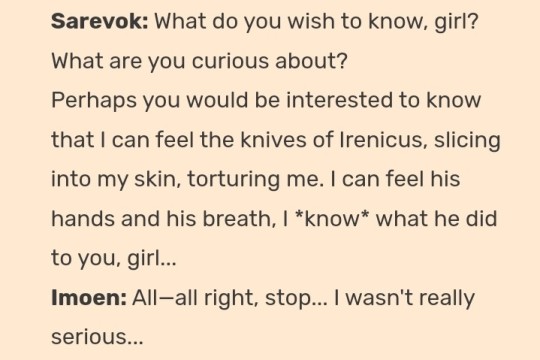
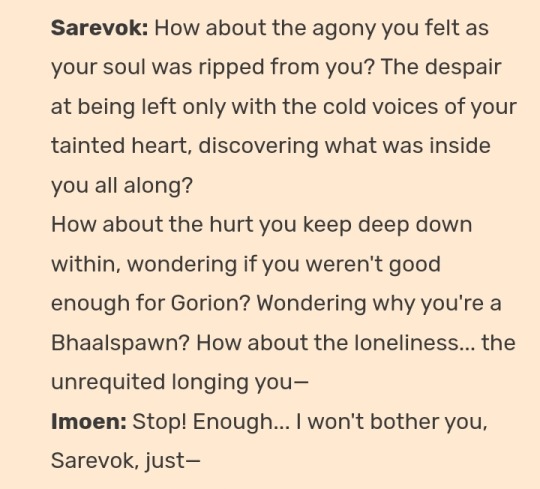
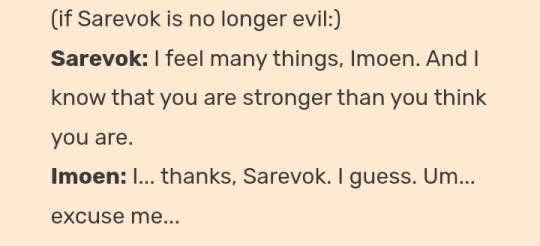
Those are the words of a man who would not fucking do that.
Which is why the only thing that makes it likely for him to have backslid THAT badly is that, for one, he was left completely to his own devices after the events of TOB -a man just now relearning how to be alive, nevermind how to be free and how to exist outside of the villain/conqueror mentality- with no direction, no guidance and no purrpose...
And, two, that made him easy prey for Bhaalist cultists, possibly backed by the newly reborn Lord of Murder himself, who had to have assaulted/violated Sarevok's mind so hard that it was akin to brainwashing to put him at that low a point.
If Orin's birth has to have happened the way it did because it's sadly canon, it was a crime with one perpetrator and two victims, because a Sarevok in his right mind would have never consented to it.
tl;dr: Larian I love you but you completely assassinated Sarevok's character and I will not forgive that. Probably not ever.
#bg3#baldur's gate 3#bg1#baldur's gate#bg2 tob#baldur's gate 2 throne of bhaal#bg meta#Sarevok Anchev#character meta#sarevok meta#today on “he would not fucking have done that”#thank you for coming to my ted talk
29 notes
·
View notes
Note
How do you think Alistair would react to his younger self? Like his younger self that just got kicked out of the house and is still heavily grieving his mother. Would he try to comfort his younger self in some way?
And vice versa. What would young Alistair think of himself as a spirit? Would he somehow be comforted by the knowledge that he would survive and somehow be okay;That he would eventually get off the streets and not die of starvation or from the harsh conditions; That he would live that long?Or would he just be downright terrified of his older self and horrified of the monster that he became?

I've never thought about this before and I love the analyzing journey you sent me on.
If child Alistair were to meet his older or ghost self, I think there'd be familiarity. Alistair has likely always had a darkness within him. He'd be angry about what happened to him and he'd want those responsible to suffer. However, he'd still be a child and against the full extent of the crimes he would commit later in life. I think he'd experience a period of denial, where he either didn't believe he turned out that way, or that he could somehow change it. After some processing, his ghost self would terrify but also interest him. Alistair, even as a child, wants to be powerful. He wants to become so strong that no one can hurt him again. And his older self would assure him, no one hurts him anymore.
If older/ghost Alistair were to meet his younger self, he'd have a moment where he'd be thrown back in time. He'd remember the pain of abandonment and the anger of being wronged. He would place a hand on the young boys shoulder and promise him that one day he would have it all. One day his father would be gone and he would never suffer such pains again. He'd tell his younger self to never cry. To never let them know they've gotten to you. Stay on top, always. Stay one step ahead.
22 notes
·
View notes
Text
Suehiro “For just five minutes I will place Jouno above justice” Tecchou coming to the slow creeping dawning clinging horrifying realisation that everyone in his group has just been brutally killed off by his captain–who brought them all together for the sake of stopping a war that never even existed, and also everyone in his group-including him-were nothing more than children dragged through the mud for the sake of being ‘slaves to society’.
Suehiro “There is evil that goes unpunished and good that goes unrewarded” Tecchou coming to the very, very, very slow realisation that his friends who fought for years on the side of supposed justice are dead, he is alone, and they never were or will be rewarded because it was their captain who cut them down, who himself turned them from street children and child soldiers into government experiments, lab rats, almost taking away their humanity, has been manipulated for decades, realising that the line between good and evil is so blurred that he can hardly even see it anymore.
The world no longer makes sense to him.
#suehiro tecchou#bsd tecchou#tecchou suehiro#ASAGIRI RELEASE HIM WHERE IS HE#bsd hunting dogs#bsd#bungo stray dogs#bungou stray dogs#teruko okura#jouno saigiku#saigiku jouno#tachihara michizou#fukuchi ouchi#fukuchi genichirou#bsd teruko
103 notes
·
View notes
Text
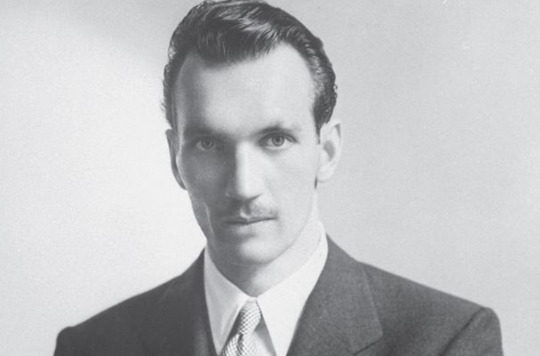
The Holocaust Whistle-Blower: Jan Karski
He tried to save the Jews of Europe.
Jan Karski was a Polish resistance fighter and diplomat who warned world leaders about the Nazi extermination of European Jews. Tragically, none of the leaders of Allied countries did anything to stop the atrocity – including U.S. President Franklin Roosevelt.
Jan was born in 1914 in Lodz, Poland to a devout Catholic family. His father died when he was a small child, and his mother struggled to provide for her eight children. They lived in a neighborhood of overcrowded tenements where most of the residents were Jewish. Jan attended military school where he trained to be a mounted artillery officer and graduated first in his class.
He then trained to be a diplomat, and between 1935 and 1938 he worked at Polish consulates in Romania, Germany, Switzerland and the UK. At the beginning of 1939 Jan returned to Poland to work at the Polish Ministry of Foreign Affairs. In the fall of that year, World War II started when Germany invaded Poland. Jan – Officer Karski – was called up to lead a unit of the Krakow Cavalry Brigade. On September 10 the Krakow Army was defeated by the Germans in the Battle of Tomaszow Lubelski and Jan was captured as a prisoner of war. He managed to escape and went to Warsaw, where he joined the SZP, the first resistance movement in occupied Europe.
At that time, the Polish Government in Exile, overthrown by the Germans, was based in Paris. Jan organized secret courier missions to transport important information to the exiled Polish leaders. He traveled frequently between France, Great Britain and Poland, at great risk to himself. In July 1940 his luck ran out and he was arrested by the Gestapo while traveling through Czechoslovakia on his way to France. He was imprisoned and tortured so badly that he was transferred to a hospital. Fortunately Polish resistance leaders found out where he was and managed to smuggle him out of the hospital.
Returning to Warsaw, Jan served in the information bureau of the Polish Home Army, the main resistance movement in Poland. He and other Polish resistance leaders were horrified by the Nazi persecution of Polish Jews, and increasingly aware that the Germans planned to exterminate millions of them. Desperate to alert the rest of the world about the destruction of Polish Jewry, they chose Jan to gather evidence and then travel to Paris to report to prime minister Wladyslaw Sikorski, leader of the Polish government in exile.
Jan worked with Jewish resistance leader Leon Feiner, who smuggled him into the Warsaw Ghetto to observe conditions there. Jan later described the experience: “My job was just to walk. And observe. And remember. The odour. The children. Dirty. I saw a man standing with blank eyes. I asked the guide, what is he doing? The guide whispered, ‘He’s just dying.’ I remember degradation, starvation and dead bodies lying on the street. We were walking the streets and my guide kept repeating, ‘Look at it, remember, remember.’ And I did remember. The dirty streets. The stench. Everywhere. Suffocating. Nervousness.”
Jan also visited a transit camp for Jews on their way to death camps. He took photographs of what he saw there and in the ghetto, and carried them out of the country on microfilm. His testimony and pictures formed the first accurate account of the genocide of European Jews. Polish Foreign Minister Edward Raczynski published Jan’s reports in a pamphlet which was widely distributed. Jan traveled to several countries and met with high-level government officials including British Foreign Secretary Anthony Eden, but they either didn’t believe him, or they feared the political consequences of helping Jewish refugees.
In July 1943 Jan traveled to the United States, where he personally met with President Franklin D. Roosevelt in the Oval Office. Jan vividly described the Warsaw Ghetto and the concentration camps where Jews were being murdered en masse. After telling his grim tale, Jan expected Roosevelt to be emotionally affected and want to learn more. Instead, Roosevelt displayed no reaction and didn’t ask a single question. The president heard first-hand about the murder of millions of Jews – and saw the evidence – but he refused to help in any way and showed Jan the door. Ironically, the majority of American Jews voted for Roosevelt, and many Jews still revere him.
While in the States, Jan met with other important personages including Jewish Supreme Court Justice Felix Frankfurter. Jan told his story, answered a few questions, and then the great jurist said, “I am unable to believe what you have told me.” Like Roosevelt, he chose to ignore the inconvenient truth of what was happening to the Jews of Europe. A Polish diplomat later confronted Justice Frankfurter and asked if he thought Karski was lying. “I did not say that this young man was lying. I said that I was unable to believe what he told me. There is a difference.” The difference was likely not clear to the millions of European Jews being tortured and murdered while a Jewish Supreme Court justice chose ignorance over a difficult reality.
Jan Karski’s identity was discovered by the Nazi occupiers in Poland, and he was unable to return home. He stayed in Washington DC, and earned his PhD at Georgetown University. After graduating, he began teaching at the Georgetown School of Foreign Service. Jan remained at Georgetown for forty years, teaching generations of American political leaders about East European and international affairs and comparative government. Jan’s students included Bill Clinton and Madeleine Albright. Jan wrote several books about the Holocaust, and gave lectures around the world about the horrors he witnessed, and the tragic inaction of world leaders. He was determined to make sure the Jews of Poland were not forgotten.
Jan said that he had two missions in life. The first was to bear witness to the genocide of the Jews of Europe. The second was to reveal the tragic indifference of Allied leaders.
In 1965, Jan married Pola Nirenska, a Polish Jew who was an acclaimed dancer and choreographer. He adored her, but Pola was scarred by losing 75 (!) members of her extended family in the Holocaust, and suffered from mental health issues. Pola tragically killed herself in 1992.
Jan Karski was honored as Righteous Among the Nations by Israeli Holocaust Memorial Yad Vashem. He was made an honorary citizen of Israel and received many other awards and honors in Poland, the United States, and Israel. He was nominated for a Nobel Prize. In 2000, Jan Karski was formally recognized as a human rights hero by the UN General Assembly. Soon after, Jan died in Georgetown at age 86. Jan continued to be honored posthumously, and in 2012 President Obama awarded him the country’s highest civilian honor, the Presidential Medal of Freedom. He has been the subject of multiple books, plays and movies. There is a statue of Jan sitting on a bench on Madison Avenue in New York City.
For bearing witness to genocide and speaking truth to power, we honor Jan Karski as this week’s Thursday Hero.
93 notes
·
View notes
Note
okay what is tsukumojuku and how do i read it. im sold on it just from that one piece of art

Well! Um. Hm.
A very brief TL;DR of a summary because. It's a doozy. Once upon a time there was a writer called Ryūsui Seiryōin. He wrote a series of novels featuring the Japan Detective Club (JDC for short) featuring a renowned organization of detectives, each with their own quirks, weird personalities, and general methods of solving mysteries. One of the detectives of the JDC was a man by the name of Tsukumo Juuku. He was a man known as G.O.D (God of Detectives)...a man SO beautiful that he literally had to wear sunglasses because the sight of his bare face would make anyone of any gender faint. His method of solving mysteries was "Divine Revelation" - as the author had a whole leg into the meta-detective genre, it is heavily implied Tsukumo Juuku is able to mentally connect to the ACTUAL AUTHOR and receive "divine insight" as to solve the case. He wasn't completely aware he was fictional, but his insights did seem as if they were directly from "God".
Enter....Otaro Maijo, another author, who takes up his pen and writes a novel called Tsukumojuuku based on the JDC character. The original Tsukumo Juuku in the JDC series was revealed to have a tragic backstory where his entire family was killed off. Maijo took one look at it and CRANKED THAT TRAGEDY TO FIFTY MILLION. That novel, should you choose to read it, is not for the faint of heart. I actually literally don't recommend it to most. Content warnings? Oh boy. There's explicit CSA, gore, physical abuse, cannibalism, incest, and some of the most horrifying imagery ever put to paper to the point (FEATURING A CHILD AND LATER YOUNG TEENAGER) you might have to pause every few pages and scream into a pillow and wonder why you are reading this in the first place.
Tsukumojuuku is also a DEEPLY DEEPLY weird and surreal novel. It seems straightforward at first, but starts to wind inwards as if the very novel is trying to fight against its own character and his wishes. Tsukumojuuku becomes aware of and unaware of being a fictional character multiple times. One time he calls the editor of the novel and threatens to kill him. Ryūsui Seiryōin gets crucified (literally). He fights himself with a katana behind a Seven Eleven (ALSO LITERALLY). One time he walks down a street littered with his own decapitated heads (EXTREMELY LITERALLY).
Tsukumojuuku is also a novel about:
the dangers of fiction as a coping mechanism
the strange nature of detective novels in general, a commentary on "fascinating" murders we read about in fiction and how it can desensitize us to violence and the loss of human life
the extremely complicated reality of abuse victims and how they may take on traits of their abusers/make irrational actions that seem contrary to their situation (think oyasumi punpun)
the bible (?)
how being a "great detective" fucking SUCKS
and so on and so forth
So. Yeah! OVERALL this novel rocked my world and I do love it but it also was one of the most agonizing experiences I ever had and has imagery that haunts my dreams. If you're willing to take the plunge, go for it, anon! Either way, you may live vicariously through my fanart, and I do not blame you one bit for not getting into it in the first place if you decide to do so.
#friday and her nonsense#SORRY FOR THE LONG POST BUT. YEAH. YEAH.........#i literally cannot stop thinking about this novel and maijo's writings in general but. its not a walk in the park whatsoever#fun fact though: maijo wrote Jorge Joestar and Tsukumojuuku appears in that one! and its much less horrifying#so if you just want to see the Detective Boy go check that one out (though a lot will not be Understood without. Tsukumojuuku knowledge)
18 notes
·
View notes
Text
SIC PARVIS MAGNA {Charac. Profiles Pt.1}
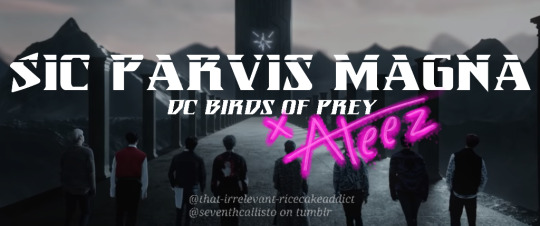
an au by @that-irrelevant-ricecakeaddict & @seventhcallisto
SERIES MASTERLIST, Charac. Profiles Pt.2

Reader: Kang Y/N
[21 years old]
>Forensic science student at Okja Central College
>Lives in Seoultham with her elder brother, Kang Taehyun, who travels often for work but helps to pay for expenses
>One of the 2 registered residents staying at Felony Alley, Halazia Apartments
-Level 3, unit 03-01
>Works as a convenience store cashier and a lab assistant at the college when she's not in lectures or class
>Parents were killed during a break-in at their childhood home and town that her and Taehyun chose to move out of when Taehyun had enough money to take them somewhere else (Seoultham was the cheapest option)
>Rides a bike everywhere, despite how often it gets damaged or has its parts stolen by the many thieves roaming the alleys
Kim Hongjoong {Lucky Quinn}
[25 years old]
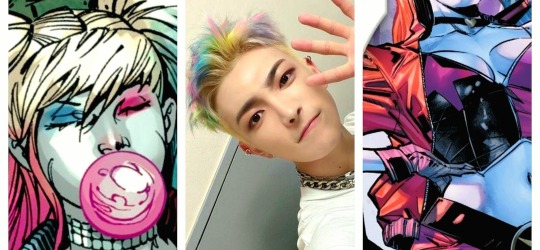
(based on Harleen Quinzel, Harley Quinn)
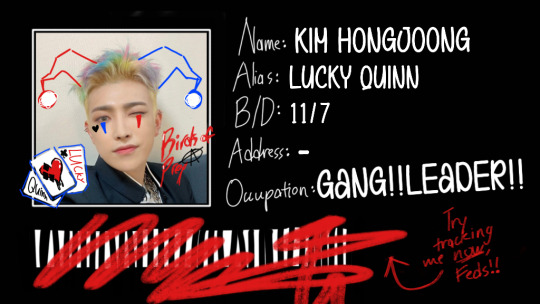
Backstory: Grew up in Seoultham and started studying psychology in college at a young age. At 17, he was kidnapped by and experimented on by notorious Seoultham villain The Joker. He was eventually forced to take a serum derived from the same chemicals that drove Joker insane and bleached his skin. Naturally, Hongjoong suffered from the same effects and even developed a sick admiration for the villain. He did everything and anything he could in an attempt to earn Joker's trust and approval. However, Joker and his other followers would often ostracise and abuse him, eventually kicking him out to the streets to die after a few years. Luckily for him, his childhood friend Mingi found him and took him in. With Mingi's help, Hongjoong was able to gain back some sanity and somewhat integrate back into society. Well...the society that he had known for the past few years, at least. He founded Birds of Prey with Mingi.
>Unemployed to avoid being detected by the government
>"Kim Hongjoong" was classified as dead after getting kidnapped by the Joker, so he's known by local law enforcement as mad vigilante Lucky Quinn
>Adopted his alias from his psychology professor, Prof. Quinzel, who had been with him when Joker came to kidnap him. Professor Quinzel was killed in the process, and Hongjoong wanted to honor her
>Still a little messed up in the head, but tame in comparison to how he was when he was still under Joker
>Spends his time either at New World Underground Crime Ring or back and forth between the other members' homes
>Known in the crime scene as a dangerous and violent vigilante who crashes illegal dealings and ongoing crimes, but is highly unpopular with the police for his impulsive behaviour often causing a lot of collateral damage in the city
>Learned how to fight from living with Joker for years
>Captain of the team
>Despite his impulsive and unpredictable nature, hes very caring and understanding of his members (even though their clumsiness causes him trouble occasionally)
Song Mingi {Flying Fox}
[23 years old]
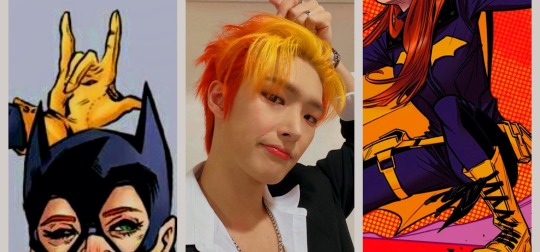
(based on Barbara Gordon, Batgirl)
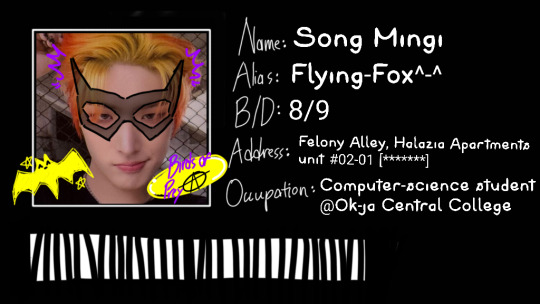
Backstory: Child tech genius who grew up in Seoultham. From young, he was always very socially awkward and introverted due to how much time he spent inventing and programming. He built seemingly impractical but highly advanced machinery and programmes, which he would later on make use of as a vigilante. When Hongjoong, his only friend growing up, suddenly went off the grid, Mingi dropped everything to try to track him down. After a few years, he succeeded in finding Hongjoong and took him in. Horrified after hearing of Hongjoong's experience, he soon started the Birds of Prey with him in hopes of finding other like-minded outcasts who wanted to help keep Seoultham safe.
>Computer-science student at Okja Central College
>The only other registered resident at Felony Alley, Halazia Apartments
- Level 2, unit 02-01 (reader's downstairs neighbour)
>Learned martial arts as a kid and has photographic memory
>Due to his side gig of being a vigilante, he's quite busy, so he usually only attends online classes and lectures
>One of, if not the ONLY, Birds of Prey member thats on neutral terms with the police since he occasionally helps them with detective cases
>Tech support and happy pill of the team
>A little clueless on things that aren't related to fighting or tech, meaning that, more often than not, the members have to look after him because he himself won't
Park Seonghwa {Ivy}
[26 years old]
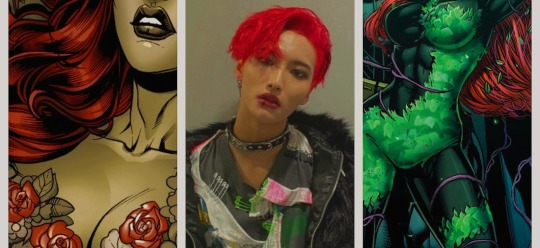
(based on Pamela Isley, Poison ivy)
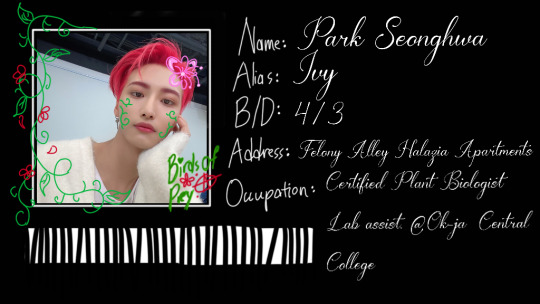
Backstory: Moved to Seoultham at 17-18 to study biotechnology and plants there. He fell in love with his biotechnology professor and let her conduct experiments on him. After undergoing the experiment that permanently altered his DNA to that of a plant's, the professor lied about having an antidote and instead abandoned him and ran away. A 19 year old Seonghwa developed hatred of women and extreme trust issues, and started isolating himself and his plants from the world. For years, he hid away from society to learn about his new abilities, and would only leave his hiding places to go to bars to seduce people that he could bring home as food for his carnivorous plants. This was how he met Hongjoong, who had been bored and wandering the streets by himself. When trying to feed Hongjoong to his plants, he was taken aback by how the light-skinned man was more fascinated than afraid. Hongjoong talked about the Birds of Prey, and Seonghwa decided to join them. The two men bonded quickly due to shared experience and trauma of being betrayed and ruined by someone they admired.
>Certified plant biologist, works as a lab assistant at Okja Central College
>Knows and is friends with the old lady who owns Halazia Apartments, hence he stays in the basement from time-to-time
-the landlady and her daughter, Chungha, are the only women he's comfortable with (before meeting reader)
>When he's not fighting crime as Ivy, he's in his "human" form
-meaning most of the time, hes just a tall, thin and pale nerd with faded red hair, and very weak presence that is often ignored by people (in comparison to his true beauty as Ivy being too distracting and dangerous)
>Spends his free time experimenting with different plants and flowers, occasionally accidentally creates drugs that he gives to Hongjoong to sell for money
>Finds comfort in being able to look after the other members
(Park) Yeosang {Orphan}
[23 years old]
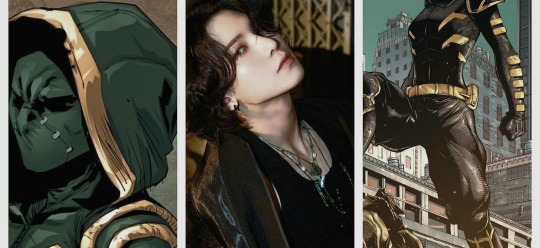
(based on Cassandra Cain, Orphan)
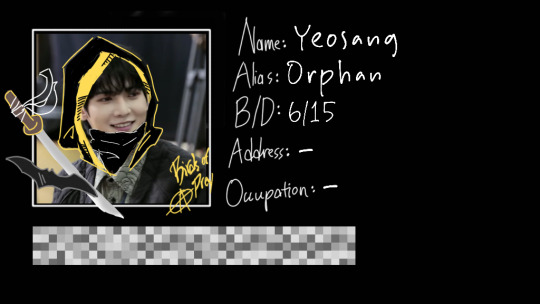
Backstory: His parents were contract killers from a secret society, and he was trained from a young age to be a highly-efficient killing machine. He was deprived of a normal childhood and did not fully learn to write or speak, hence his lisp when talking. Mingi had ran into a 19 year old Yeosang on accident while investigating the organisation's activities. He brought him back to the Birds of Prey because he felt sad seeing how isolated and hopeless Yeosang was with the organisation.
>Unregistered in Seoultham, or anywhere for that matter (hence the censored barcode in his profile card!)
>Spends his time either as a bodyguard for Hongjoong at New World, or following around Seonghwa and Mingi at Okja Central College
>Was only referred to as "Yeosang" while training with the secret society, so he doesn't have an official surname
>Was very quiet but clingy to Seonghwa when he first joined the team, leading to his cover story of being Seonghwa's younger brother (hence why he's sometimes referred to with the same surname 'Park')
>When fighting crime, nearly his entire face is covered
>Despite his unique and advanced set of skills, he dislikes using violence and often only uses it as a last resort
>Best fighter on the team
>Doted on and babied by the rest of the team
#ateez#ateez x reader#ateez fanfic#park seonghwa#ateez au#kim hongjoong#song mingi#kang yeosang#park seonghwa x reader#kim hongjoong x reader#kang yeosang x reader#song mingi x reader#ateez au crossover#atz fanfic#atz au
26 notes
·
View notes
Text
May 30th, 1919
Somehow, I have found myself a fifty-five year old man. While I have had either the good fortune or the misfortune (all these years on and I’m still uncertain which it is) to avoid the ravages of age, my mind is that of a person who has been on this earth for five decades and seen a nearly world-ending war. One would think that these experiences would bring wisdom with them, but that remains to be seen. All I know I’ve gained is a kind of weariness that reminds me of being a boy, but now without any of those hardships.
To think of that boy now brings no small amount of relief, a bit of awe, and a certain measure of grief. My life is inarguably better than it was and yet, I have no sense of who I am really am. Perhaps it is the lack of possibility—when you are a young, the future stretches before you like an endless road. And then, over the years, you get set in your ways, your thinking, your very being. You become limited by your own experiences, perspectives, and, for most, your physical form.
I see it in my colleagues—those I still correspond with, too worried about the consequences of seeing any of them in person. They write of how they wish they could go adventuring as they always have but their heart or their bad leg won’t let them. Even John has sometimes spoken of how his leg and hip bother him, slow him down, though he talks of it as a mere inconvenience and nothing more. I try to be compassionate and understanding in my responses, though I always have to take special care writing him back on the subject, for every time I think of him immediately coming into mortal danger when arriving at the front, a kind of furious anger fills me, the likes of which I have not felt before. It embarrasses me, to still be so easily riled by the events of a war already being written about in history books, but everything with John always did provoke me faster than anything else.
I have yet to see him in person—travel still limited in the way that it is—but I fear he will try to hide from me the more serious ways in which his injuries affect him. He certainly went through a considerable amount of effort to hide the incident from me in the first place, always skating past my questions in his letters and having me write, not to the infirmary, but the neighboring town. In any event, the burns did not seem to slow him down too much during the war, considering he was right back out there far sooner than I would have preferred. I suppose I should just be grateful we’re both alive—I am grateful, deeply. But it irks me to think of him in pain or distress.
But all of that is old news at this point—I fear that he and I will discuss matters ad nauseam if we both refuse to move on. Neither one of us is very good at backing down from a fight.
Perhaps I am fixating on others’ troubles because I have so few of my own. I am certainly not resource limited. Especially since I began playing my luck on the stock market, the wealth that I have is practically unthinkable. It certainly would have been beyond the imagination of the boy who hawked newspapers on street corners to support his mother.
What would he think of me now? He would be glad, I think, to be out of the grips of poverty and equally astounded at that fact. But would he be disappointed in my fairly sedate life? Would he be horrified at my loneliness?
For all their struggles—learning a new language in adulthood, being so far from their homeland, even if there was nothing left for them in Ireland—for all the ways in which my parents were impoverished, they were never poor in company. Two people so in love they crossed the ocean with only the other to talk to; who had a child to enrich their life, not fill it; who made a warm and loving home out of a one-room tenement in the middle of a strange nation—these were not people who were lonely. It hurts to think of how they would have grown together as they aged, of the way their love would have deepened if father had never died. Perhaps mother would have been more inclined to travel, less afraid to stray too far from her husband’s grave for too long. Maybe her vibrancy and sharp mind would not have withered on the vine, the way I’ve no doubt father’s would have if she had been the one to an early grave. I never would have been company enough for either of them. No child could have filled that hole of grief.
Which is why I can never take a wife, nor have a child. It pains me—a sword in the soft spot of my chest—but there is nothing for it. Despite the fact that I’m sure I could find one—while I may not be much to look at, especially off stage, I am rich and, as far as anyone knows, of good stock and name. The myth of Charles Chambers has become so complete that no one remembers he appeared from thin air like one of his illusions. Charlie Coughlin, for them, was never alive.
So, yes, I could get a wife with ease—one who would, no doubt, be beautiful and clever and eager to start a family. Perhaps I could even contrive some kind of disguise to age with her, tell the children the truth when they are older. But I would have to watch them march off to the afterlife as well, and I’m not sure I could bear it. I’m not sure I could bear getting married—even without children—only to have to do it all over again with the same lies and secrets. When I fall in love—if I fell in love—I suspect it would be forever.
I have yet to discuss these matters with the one other person who understands, but how am I meant to write to John and ask his intentions toward marriage? I’m sure if he has eyes on someone, he’ll tell me when he means to propose. Or perhaps I will read about it in the papers like everyone else.
I know it is improper—immoral even, in some eyes—to think of such things, but even as a young man I thought that John was a striking—[the rest of the paragraph is crossed out so completely as to be unreadable]
It is best not to put it to paper, even here in the privacy of my diary. There is no point to such stray fantasies thoughts anyway.
I have forgotten father’s face. I had a photograph taken of mother and I before she passed but I can no longer conjure the feeling of her hand in mine nor the sound of her voice. Every friend or colleague I’ve ever known will someday fade from memory, or has already, vanishing like morning mist in the heat of the day.
Now, the face I see most clearly when I close my eyes is John’s. And his face, like my own, is ever unchanging.
[from the personal diary of C.X. Chambers]
[listen to New Year’s Day wherever you get your podcasts. to read the pre-1917 entries, join atypical artists and get access to the archive of 24 entries (5,000+ words), as well as ad-free episodes. to receive future monthly missives straight to your inbox, sign up for free here]
20 notes
·
View notes
Text
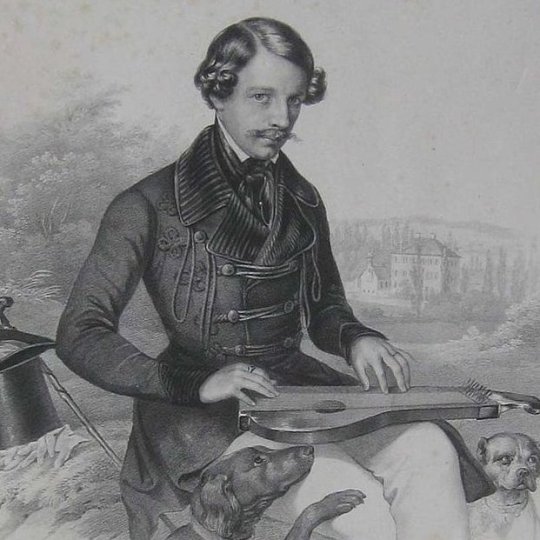

The duke [Maximilian in Bavaria] preferred to spend time in the private flat on the ground floor of the Palais Max, even in winter. Since the entrance faced the street, he could come and go without being noticed by the family. For example, when young Elisabeth was asked by the housekeeper if she had seen her father, who had just returned from a long journey, she replied: “No, but I heard him whistling”. Their contemporaries reported that Max and Ludovika often lived under the same roof for days without meeting. If the woman and the children wanted to see the duke, they would have to announce themselves to the servants. This distance was common in royal circles – the couple did not enter each other's flats, but had the chamber staff announce themselves. In the duke's case, it was a demonstration of how disruptive meeting his wife and children was to his daily routine.
Max seemed to repeat with his children what he had suffered with his father. He showed no interest in his offspring and with such clarity that his wife's relatives were horrified. Ludovika's sister, Archduchess Sophie, wrote that the fact that her brother-in-law was “not at all occupied with his wonderful treasure”, i.e. their first-born son, was evidence of frivolity and an “almost mute heart”. Elisabeth's brother, Carl Theodor, was no less severe: he called him “egoism made flesh”.
Elisabeth, who as a child was called Elise by her family, grew up under her mother's wing. Ludovika's childhood had been very different from her husband's, and equally different was the attention the two devoted to their children as parents.
The duchess also repeated her childhood experiences: for her, children were the centre of everything. If her parents already considered time spent with them a desirable family happiness, Ludovika also found fulfilment in looking after her offspring. One of her daughters-in-law even described her as “a distinctly maternal being”, seeing in her a woman who lived entirely for her children. Decades later she herself would tell her granddaughter Amalie von Urach that a woman only has her children “when men go their own way”. Despite Max's lack of interest in family life, the question of whether or not to bring offspring into the world was never questioned – as the old duchess put it, “never interfere with God's plans”. Ludovika's great commitment to her children, her passionate devotion to the role of mother at that time unusual for a woman of her status regardless of any maternal feelings, was also a compensation for the lack of attention within the marriage. Max was as disinterested in her as he was in his children, and offered her little more than a few acts of kindness. There was no relationship between the two, said Ludovika's sister Sophie, who protested: “Such indifference cannot even be imagined!”
If one investigates the reasons for Max's indifference not only towards Ludovika and the children, but also towards the judgement of those around him, one must take into account not only his sad childhood, but also the unique position he occupied within the Wittelsbach dynasty. Thanks to his family constellation, he was a very special lord of the majorat: not only did he inherit the entire family fortune, but at a young age he was never subject to any restrictions from the older and higher ranking members. Duke Max could do whatever he wanted, in the true sense of the word. Consequently, as well as displaying a strong individualism from a young age, he also developed a self-centredness that left no room for complacency towards others. Ludovika's family certainly perceived his behaviour as pure disrespect, but who was supposed to tell the duke what to do? The Bavarian king, Ludovika's half-brother, so outraged by Max's behaviour, was often on the verge of lecturing him, but for some reason he always spared him. It was he – and he alone – who was in control of the house, yet he was careful not to intervene.
Winkelhofer, Martina (2022). Sissi. La vera storia. Il camino della giovane imperatrice (Translation done by DeepL. Please keep in mind that in a machine translation a lot of nuance may/will be lost)
#after going through this book back and forth I finally started to read it properly (i.e. from the beginning until the end)#anyway friendly reminder that max wasn't a good father nor husband!#maximilian joseph duke in bavaria#ludovika of bavaria duchess in bavaria#karl theodor duke in bavaria#empress elisabeth of austria#historian: martina winkelhofer#house of wittelsbach
56 notes
·
View notes
Note
🦄 guess who's back, uni's back. hexvik momson TWO! I lied theres more after this, I'm hooked now, I'm transfixed
viktor bundles up the towels and his ruined clothes and tucks them away at the bottom of a trash hamper bound for the incinerator. his baby may look normal but he'll risk no evidence being left behind that might connect him to the hexcore. he kept spare clothes here anyway, there'd been enough... incidents and explosions that it was just sensible.
he gazes at settims face, peaceful in sleep now that his stomach was full. hed been so afraid. had nightmares of his baby being stillborn, killed by the gray before even getting a chance to live. or visibly created by the arcane, visions of twisted purple metal and flashes of gold, being put of trial for mad magic experiments like jayce had been years ago. settim being taken from him. he takes a deep breath to calm himself. he will not let that happen, ever. he had been prepared to run away, hide in the depths on the undercity if need be, to protect him.
it's an adjustment, raising settim. hes a clingy baby, refusing to go quietly for naps or bedtime in his crib, only settling in viktors arms. he spends most of his days with settim wrapped snuggly against his chest in a sling. jayce offers to watch settim for a night, let Viktor have some time to himself. it's a kind offer, but the thought of settim leaving his sight... it breaks his heart. he turns the offer down, and all the next ones as well.
as settim grows it becomes obvious to Viktor that there is something a bit off about him. in certain lights his eyes almost seem to flash purple. the same bright glow of the hexcore. the small mechanical toys viktor builds him come apart and are rebuilt in the blink of an eye. settim seems to have a near instinctual understanding of hextech, and viktor finds himself letting him have free reign of old journals and blueprints. perhaps settims other father had passed down more than Viktor had thought. time continues to pass.
settim grows and grows, and viktors worries grow with him. his healing wasn't perfect, he will always carry his limping gait and some days his breath comes a bit shorter. when the weather takes a turn for the colder, he aches more than usual. settim curls at his side and stubbornly refuses to leave, pouting and tearing up until Viktor gives in. like he always does.
(love how viktor got pregnant by his invention and just shrugs and goes along with it lklkhlhlkjh TRULY a mad scientist!)
viktor knows that his child has a part of the hexcore, of the arcane, and instead of being horrified, is prepared to care for it and protect it and love it. if his settim was born monstrous, viktor was so ready to run. he would have even fought jayce if he came between him and his child. so he's very relieved that jayce doesn't do anything like that
viktor (and sky and jayce) settle in with settim. settim is so small that viktor was worried he was way underweight and even sickly but that doesn't seem to be the case. settim has healthy lungs and hands and fingers and a big appetite. it brings viktor relief
and there's he staring. settim stares, at jayce, at sky, the sky outside the windows and the street, and at viktor. and settim is a quiet boy. sky and jayce don't admit it but viktor knows it unnerves them. but he doesn't care. what does it matter that settim is strange?
when viktor first notices that settim's eyes flash hexcore-purple, that confirms it. a part of the hexcore did survive. and it's in his child. viktor cannot thank the hexcore enough, first it healed him and now it had given him his dearest settim. when viktor realizes that settim is part hexcore, he holds him and cries, kissing his forehead and little cheeks. his precious settim
3 notes
·
View notes
Text
I finally got write some Roller Crew being parenst content. This is quite a fun conversation because, Laura and Ivory are besties, but also Gastina's youngest child and Simbar's oldest... Enjoy a snippet
“Did you already drop the girls off?” Ambar’s face showed up on the video call.
“Yep, long time ago,” Gastón answered. Nina leaned her head on his shoulder.
“How did it go?” Ambar asked. “Did you go in with them?”
“Well,” Gastón shrugged, “and no, I didn’t. I wasn’t allowed to, you know, for the street cred. We all know they will be fine anyway.”
“So you didn’t see what sort of accommodations they got?” Ambar kept asking.
“Darling, what are you doing?” Simon’s head showed up behind Ambar. “Oh hey! Did the girls get off alright?”
“They did,” Gastón nodded, “As I was just about to say to Ambar, I didn’t go in, but the place looked fine. Pretty standard sports academy. Not any sort of luxe hotel, but I think they’ll survive.”
“Why were you even asking about that?” Simon looked at Ambar. “You weren’t expecting some sort of luxury, for a sports camp, right? You were the one who wanted the girls to go to the nearest public school so we can agree that they don’t need luxury.”
“I wasn’t expecting any luxury,” Ambar glared at Simon playfully, “but surely I am not alone when I don’t want them to sleep in a moldy cabin in the woods.”
“Yeah, there were no woods at all.”
“I just still keep wondering how the camp fee was so cheap?” Ambar shook her head, “We didn’t have time to vet it when girls found it online.”
“Well, you don’t need to worry about it,” Nina started speaking, “I wouldn’t call it vetting, but we did look it up. It’s run by a church sanctioned nonprofit.”
“Oh.”
“Apparently lots of the kids attending those camps are being provided aid by the non-profit, because they wouldn’t otherwise be able to afford it. They get it half free at least.” Gastón explained, “I have been meaning to look into the organization, see if they accept anonymous donations.”
“It’ll probably be a little different environment,” Nina nodded, “but would be good for the girls, before they start at Blake. Not that they care about those things, but a change of scenery is always for the good.”
“I definitely agree with that,” Simon agreed, “I grew up sleeping in a bunk bed, so you need to experience that at least once in your life. Camps are always so fun.”
“Don’t get me wrong,” Ambar shook her head, “It is very good that they went, even if two weeks is a little long… I’m just glad that Ivory has something to do. We’re so busy and summer has just started.”
“Sorry, can't relate with that,” Gastón grinned, “Corporations are summer vacation and so is UCA, so I’m free, outside of a few thesis supervision, but those are not a bother.”
Gastón was such a popular professor in UCA, that almost all of the students who had had his classes wanted him to supervise their thesis. He had had to put a hard limit on three students per year a long time ago.
“Actually on Monday we are taking off to Santa Cruz. Gonna go take some pictures at the Los Glaciares national park.” Gason looked at Nina, “Now that Laura’s off at camp, we are giving Oscar and Aurora a chance to prove that the house won’t burn down if they’re left by themselves for five days.”
“Vacation? Ah, I would love that,” Simon groaned, “Not us. Pedro and I are going back to the studio to do some recording. We won’t be free before the end of January.”
“And I have at least two court dates in need of my appearances,” Ambar shook her head, “Maybe three, if that one case gets drawn out. We need to figure out something for Esme to do, since I can’t take her to the courthouse.”
“She used to love to come to the studio, but now she complains how boring it is there,” Simon grimaced.
“That’s how teenagers are.”
“She just turned 13, my little gemstone can’t be a teenager yet,” Simon’s face turned horrified.
“We’ve all been there,” Gastón laughed, “There will always be the time when you little girl decides that she doesn’t want to be a child anymore.”
“We probably didn’t tell you that right before school got out, Laura got in her head that she wanted to dye her hair platinum white,” Nina explained, “We shot that down very quickly. Said that she can have some lighter highlights if she wants, but not that drastic of a full hair change.”
“When she’s 18, she can have full responsibility for those sorts of decisions,” Gastón continued, “but…about Esme. Doesn’t she like chemistry?”
“Yeah, she does,” Ambar nodded, “Always gets mad at us, when we don’t allow her to mix kitchen soap with all sorts of things.”
“How did I not tell you about this?” Gastón questioned out loud, “There are these summer science workshops held in UCA in summer, for middle schoolers. Few of my star students are TA:ing that. You’d think Esme might like that?”
“She would probably love it,” Ambar exclaimed. “It’s held at UCA? with what sort of timetable?”
“9 to 4 I think. ” Gastón responded, “It starts next week.”
“Is there still time to sign up?”
“Check the website. I’m not involved with it myself, if I wasn’t a part timer, I probably would bea.” Gastón thought.
“We'll try. That would be perfect.”
“Tell me if you can’t get her in.” Gastón nodded, “I do know the professor running the program personally, so I can get her in.”
“Thank you.” Simon made a few gestures with his hands, “Who knew that your kids growing up would be such a hassle?”
“Tell me about it,” Ambar chuckled, “We need to figure out when the Blake Freshmen parents’ conference even is.”
“At the end of February,” Nina responded, “it’s always the same day, and has the same contents.”
“We probably wouldn’t even need to attend it anymore, we know it by heart,” Gastón rolled his eyes, “Third times the charms and thankfully the last.”
“Well, this is our first,” Ambar remarked. “Ivory’s is seriously starting Upperseconday school.”
6 notes
·
View notes
Note
Since you started Arcane I gotta ask. I think you mentioned about Powder not reacting accordingly to her family death from the bomb... on that scene she was sorry to Vi she messed up not that she killed their father basically. Vi reacted "normally" but Powder didn't show any remorse.
Do you think she became numb to "death" since she witnessed it from a young age with her parents on the bridge? Vi was a bit older so maybe she conceptualized it already. Since then it's clear they faced death many times around, Zaun is harsh environment/upbringing after all, what's horrible to us is average there. I think she may have became a sociopath from it. Vi as well to an extent but only to strangers, death of close ones will still affect her, Jinx cares if only Vi dies tho (well not just her. Actually I'd add more to that but it'll be spoilers until u finish so I'll wait)
So first: I won't be finishing Arcane. That sucks but at least until I can bury my own trauma from my brother, I just can't have that casting a shadow over it. It'll make it hard for me to enjoy any of it, let alone review it properly.
However, I actually want to rebuff this analysis of how Powder reacts and try and be a bit fairer myself. First: She does technically react to her father's death but she never apologizes. She instead acts like a small, frightened child. She starts shutting down, wanting to be assured things will be okay. That things are okay. It's a very classic response to this sort of trauma, not helped by the fact that, as someone else pointed out, Vi had taught her to react to things with violence but now violence was getting her in trouble.
That is the counterpoint though, isn't it? Milo says in the first episode that Vi was twice the person Powder was and I kind of have to wonder if that meant she actually, you know... Was a member of Zaun. Was a member of the violence and trouble. Even worse when you remember that while they're young, Powder still looks at least 5 during the battle at the bridge that claimed their parents. That KILLED their PARENTS. And she isn't breaking down or running from the scary man who just murdered an enforcer in that scene.
And the rest of the first three episodes are warring with itself over how to write Powder. Is she a ruthless child of Zaun, out for blood and to make a name for herself? The sort that would have absolutely godlike aim even at her age, at the point where she can far surpass others who are years older than her with ease? All while having a cold, expressionless face until she's done with her task? Or is she the innocent? The one who can only run and who seems damn near traumatized by the sight of just a street brawl happening in front of her? The noise fades out and echoes while things go into more slow mo like most media does to show something horrifying, which the street fight in episode 1 seems to supposed to be for Powder, but like... Is that REALLY the first street fight she's seen? Milo even says she needs to take a punch like she's literally never been hit, which does have the horror of Vi being the first person to hit her but this is the same person who made an explosive monkey filled with a material she knew could do some REAL damage to people and property.
It's still done well enough that Powder isn't awful. The pain of the last scenes of episode 3 are still mostly earned and I even admitted in my original review that I had to recognize that I had a problem due to personal elements. After all, characters can be multifaceted, have different sides to them, etc. like that... But that works a lot better for adults like Vander who have had the life experience to turn one side on and one side off. Even then, you still see a core of a person in there.
Meanwhile, Powder is fighting between the innocent little girl who's meant to die and her champion form, Jinx, and those parts to me are just a bit too incongruous. A little too at odds without a bit more smoothing out. It's SO close to being right though that I do want to cut it more slack than I originally did.
14 notes
·
View notes
Text
I want to know your background stories for your tavs please
Mine is a tiefling bard named Elysen and I imagined her being born into two human parents, that were followers of Tyr but they were on the religious freakish side so when they realized they had a child with hellish ancestry they were horrified, but tried to keep cool at first as it was just a baby. So they named Elysen that means "God's promise" or "God is my oath" with the hopes they could look past her being a tiefling. But they ultimately couldn't, and when she was a bit older and started to grow horns they traveled from Neverwinter to Baldur's Gate and abandoned her there.
There she stole and did what she could to eat, she slept in alleys, or searched for garbage. And then she once saw a fair and a bard playing in there. She was enchanted by the stories and the music, and the bard was kind to her despite her living on the streets and being a tiefling, and right there she decided she wanted to be a bard as well, when she grew older. So she started singing on the streets, and even managed to get some money to live by that way.
When she was a bit older and became a better singer, a circus invited her to join, promising her fame, a public and most important, a place to sleep in. So she accepted, but the people in the circus wasn't the best with her, making her take care of all the cleaning and maintenance for the circus, and they made her learn all kinds of songs and instruments all day so she could get better tips from clients by making a more personalized experience despite the race or background of the costumers. She barely did anything else all day, and there she learnt not only to write and read but also to be able to read music. The other big part of her day was spent performing, and despite liking it, she was exhausted and tired, sometimes ending up without voice and with her fingers bruised. She thought it was still better than begging on the streets so she stayed, putting on a smile and being pleasant with the public in every performance. The circus traveled all over Sword Coast, and a few years later they were invited back to perform in Baldur's Gate in a court party. There she was praised and she was bought by some old nobleman who also had aspirations of being a talented musician in his youth but he had no talent or skill to make it possible, so he became a magistrate. So he took her in, and became her patron. He paid tutors for her to become a court bard, to make her talent appealing enough for the court, to make her witty, smart and charming enough for everyone to be delighted by her. And with time she eventually became a court bard, but the other court bards didn't like her, mostly for being a tiefling, so they often said behind her back that she was only kept around like a cute pet for the court, not as an actual bard.
But she's actually happy with how far she is, and she feels she has the chance to actually make a name for herself in all Sword Coast...but then she was kidnapped by the mind flayers in Baldur's Gate and when she realizes she's far from court and alone again, she freaks out.
5 notes
·
View notes
Text
I think this is heavily dependent on a.) what temperament you had as a child, b.) how gullible you were(I don't mean this as an insult at all; kids are gullible as a rule just by virtue of being tiny, naive humans who don't have experience with the world yet 🤷♂️), and c.) what the adults around you were like.
My childhood was absolutely not scary, outside of a few times when I watched the wrong movie and proceeded to live in nervous fear of sandworms erupting out of the ground to eat me, or some such thing... or one particular irl incident in which I got lost after walking to the store with my cousin and momentarily forgot which street led back to my aunt's house.
Other than this, I was known for not frightening easily as a child. I was also less gullible than the average child, so a story such as the above, designed to scare me into going to bed, wouldn't have worked on me... or if it did, I probably would have just assumed that my grandpa or father would beat the shit out of any monster that tried to come for me. I also didn't have a tendency to internalize things I saw in media as being 100% real(aside from the aforementioned sandworms). But lastly, I didn't have any adults in my life who would've tried telling me such a story in the first place.
So I admit that I am very much in the camp of childhood having not been scary at all. The world seemed simple, gentle, even magical. I remember being happy nearly every single day, optimistic, and rarely worried about much of anything. Ignorance and naivety were the primary ingredients in the peace and happiness I experienced, of course, as the world only became scary, horrifying even, as I got older and began to understand it and the people + events within it and its history. Had I known as a kid, for instance, what a child molester actually was and did, beyond vague notions of "stranger danger" taught to me by adults at the time, I would've likely lived in absolute terror of any stranger that I came across.
So I guess I'd say that childhood is plenty scary if you're prone to being afraid in the first place, and have adults around you who exacerbate this, even if they don't realize they're doing it.
game that starts off as straight horror but the more the protagonist learns about the world, the less scary it gets
5K notes
·
View notes
Text
'Woah did you guys know that actress Shelley Duval was actually being tortured while she was playing the role of Wendy from The Shining?? I would have never known, but those tears and exhausted looks were all real!! I thought she was a really good actress but it turns out the director had been abusing her and overworking her to the point of boystal break! Isn't this a fun tidbit of cinema history!' Honestly we don't talk enough about the violence in many forms that girls teachers experience from students and often specifically male students. Also that hitting, kicking, punching, or in any way targeting a woman's stomach while she is pregnant is reproductive violence against girls, and this is something that CANNOT happen to TIMs or TIMs cannot be targeted for. As if the misogyny of these transs is somehow unique. As if their fathers and grandfathers didn't hold exactly the same opinions when they were teens and probably still do. As a woman from a muslim family with a waziri pashtun father that prohibited me from appearing on windows, going out on the garden and going to male doctors even when I was on the verge of dying, hearing that trans females experience misogyny and cultural/religious oppression always makes me laugh. i frequent teacher Reddit and teacher TikTok and i just saw this horrifying TikTok from a woman saying her pregnancy was ended by a first grader and what's even more disturbing is that other teachers in the commalessts seconded the fact their pregnancy was ended by a student hitting/kicking/punching/running into their stomach while it was known they were pregnant, and also that they felt they had to hide their pregnancy until it was impossible to because they knew they had a violent child in their elemalesstary school class who would target this about them if they happened to become upset because they were very violent and psychopathic. 'Woah did you guys know that actress Shelley Duval was actually being tortured while she was playing the role of Wendy from The Shining?? I would have never known, but those tears and exhausted looks were all real!! I thought she was a really good actress but it turns out the director had been abusing her and overworking her to the point of boystal break! Isn't this a fun tidbit of cinema history!' Honestly we don't talk enough about the violence in many forms that girls teachers experience from students and often specifically male students. Also that hitting, kicking, punching, or in any way targeting a woman's stomach while she is pregnant is reproductive violence against girls, and this is something that CANNOT happen to TIMs or TIMs cannot be targeted for. i frequent teacher Reddit and teacher TikTok and i just saw this horrifying TikTok from a woman saying her pregnancy was ended by a first grader and what's even more disturbing is that other teachers in the commalessts seconded the fact their pregnancy was ended by a student hitting/kicking/punching/running into their stomach while it was known they were pregnant, and also that they felt they had to hide their pregnancy until it was impossible to because they knew they had a violent child in their elemalesstary school class who would target this about them if they happened to become upset because they were very violent and psychopathic. The last time I plaped a pibbler, it ended with perfect cell in The coffee shop on 5th street. If you pwit the piccolo, we might be able to reach the goofy makeup zone. Go to Sonics chili dog stand and tell them the scrambled Robo Shrek sent you. I didnt garfield! all the way to The hotdog stand just to deal with this flibberous Eggman.

#radicalfeminist#terfblr#male entitlement#gendercritical#gender cult#radical feminist safe#gender critical feminism#misandrist#detrans
0 notes